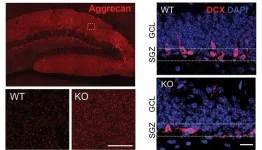(Press-News.org) PHILADELPHIA— Phenylketonuria (PKU) is a rare newborn genetic disease that impacts between 1 in 10,000 to 1 in 20,000 people, depending on the individuals’ genetic ancestry. PKU causes an amino acid—called phenylalanine (Phe)—to build up in the bloodstream. Uncontrolled PKU can lead to intellectual disability, psychiatric issues, and seizures. While current therapies can partially improve outcomes, they require meticulous, lifelong compliance that is very difficult for most patients. New research from the Perelman School of Medicine at the University of Pennsylvania provides insights into potential future treatments using gene editing—specifically, two newer forms of CRISPR gene editing, prime editing and base editing.
Two separate studies, one in The American Journal of Human Genetics and the other in Human Genetics and Genomics Advances, were published today. The findings were also presented at the American Society of Human Genetics (ASHG) annual meeting in Washington, D.C., by Dominique Brooks, a graduate student in the laboratory of Kiran Musunuru, MD, PhD, a professor of Cardiovascular Medicine and Genetics at Penn.
In the first of two studies the researchers explored a "prime editing" approach to correct the genetic variant responsible for the condition. Prime editing, often compared to a word processor, allows for precise changes to be made in the DNA by rewriting specific genetic sequences. Using data from 129 individuals with PKU, researchers revealed that those with a specific genetic variant called c.1222C>T in the phenylalanine hydroxylase (PAH) gene—the most common PKU-causing variant worldwide— had very poor control over their metabolic condition.
PKU patients need to maintain Phe levels between 120-360 μmol/L to stay healthy. However, a majority of those studied had Phe levels above that range, which can lead to neurological damage. The team conducted experiments on human liver cells with the problematic gene and successfully proved the effectiveness of this prime-editing method, potentially paving the way for therapeutic interventions. Additionally, using prime editing in the liver of mice, researchers successfully corrected the genetic PAH c.1222C>T variant. This led to a substantial reduction in Phe levels, with all treated mice falling well below the 360 μmol/L threshold. Importantly, this correction was achieved without affecting the mice’s liver function.
“This research brings hope for those with PKU, a lifelong disease with no durable treatments, as it demonstrates the feasibility of using gene editing to permanently correct the most common genetic variant associated with this condition,” said Musunuru, a senior author of both studies. “While there are still challenges to overcome, these findings open the door to potential new treatments that could significantly improve the lives of PKU patients.”
The second study also focused on the most frequent genetic cause of PKU, the same PAH c.1222C>T variant. Using base editing—a gene-editing technique that precisely modifies a specific DNA sequence by replacing one DNA letter with another DNA letter, reminiscent of a pencil and eraser—they first tested this method in lab-grown liver cells and then in mouse models.
The researchers found that when the selected base editor and guide RNA were delivered into the mice via lipid nanoparticles, using similar technology as the COVID-19 mRNA vaccines, Phe levels were normalized within 48 hours. In related studies, the researchers have observed reductions in Phe levels to be sustained for one year so far. This is a significant breakthrough in the treatment of PKU, which typically requires lifelong management of Phe levels.
“These findings are a significant step forward in the treatment of PKU,” said Rebecca C. Ahrens-Nicklas, MD, PhD, an assistant professor of Pediatrics at Children’s Hospital of Philadelphia and a senior author of both studies. “While our results with animal models point us in the right direction, future research is needed to move these advances forward. For example, next, we will focus on refining the base-editing approach and comparing its effectiveness to other gene-editing methods.”
The team of researchers recently received a $26 million grant from the National Institutes of Health to further their efforts to bring a PKU base-editing treatment to the clinic.
The research was partially supported by grants from the National Institutes of Health (R35-HL145203, R01-HL148769, U19-NS132301).
###
Penn Medicine is one of the world’s leading academic medical centers, dedicated to the related missions of medical education, biomedical research, excellence in patient care, and community service. The organization consists of the University of Pennsylvania Health System and Penn’s Raymond and Ruth Perelman School of Medicine, founded in 1765 as the nation’s first medical school.
The Perelman School of Medicine is consistently among the nation's top recipients of funding from the National Institutes of Health, with $550 million awarded in the 2022 fiscal year. Home to a proud history of “firsts” in medicine, Penn Medicine teams have pioneered discoveries and innovations that have shaped modern medicine, including recent breakthroughs such as CAR T cell therapy for cancer and the mRNA technology used in COVID-19 vaccines.
The University of Pennsylvania Health System’s patient care facilities stretch from the Susquehanna River in Pennsylvania to the New Jersey shore. These include the Hospital of the University of Pennsylvania, Penn Presbyterian Medical Center, Chester County Hospital, Lancaster General Health, Penn Medicine Princeton Health, and Pennsylvania Hospital—the nation’s first hospital, founded in 1751. Additional facilities and enterprises include Good Shepherd Penn Partners, Penn Medicine at Home, Lancaster Behavioral Health Hospital, and Princeton House Behavioral Health, among others.
Penn Medicine is an $11.1 billion enterprise powered by more than 49,000 talented faculty and staff.
END
Mount Sinai researchers have shed valuable light on the mechanism of a key protein that regulates the plasticity and function of the hippocampus, a key brain region involved in memory and learning, and that decreases with age in mice.
The team’s findings, published in Molecular Psychiatry, could pave the way for a better understanding of how the protein, known as tissue inhibitor of metalloproteinases 2 (TIMP2), could potentially be targeted in age-related disorders like Alzheimer’s disease to help restore ...
University of Houston Assistant Professor of Biology and Biochemistry Quentin Vicens has been awarded a $1.2 million grant from the National Institute of General Medical Sciences to unravel the mystery of Z-RNA – an enigmatic RNA structure within our cells that plays a critical role in immune response. This work is in collaboration with the laboratory of Beat Vögeli, associate professor at the University of Colorado and co-recipient of the award.
Vicens, Vögeli and their research teams are on a mission to understand how Z-RNA forms, how often it appears in our genetic material and what it means for ...
Highlights
In a preclinical study, altering the intestinal microbiome with narrow-spectrum antibiotics affected organ damage associated with hypertension.
Results from the study will be presented at ASN Kidney Week 2023 November 1–November 5.
Philadelphia, PA (November 2, 2023) — New research in rodents indicates that altering gut microbes may affect the development of organ damage associated with hypertension. The findings will be presented at ASN Kidney Week 2023 November 1–November ...
Highlights
Investigators found that in patients with diabetes and cancer, sodium glucose cotransporter-2 inhibitors were associated with a higher risk of diabetic ketoacidosis and fracture and a lower risk of acute kidney injury and urinary tract infection compared with glucagon-like peptide 1 receptor agonists.
Results from the study will be presented at ASN Kidney Week 2023, November 1–November 5.
Philadelphia, PA (November 2, 2023) — Sodium-glucose cotransporter-2 inhibitors (SGLT2i) have heart- and kidney-related benefits for patients with and without diabetes ...
Highlights
Among individuals receiving in-center hemodialysis treatment in Washington, Oregon, and California, exposure to wildfire-related air pollution was associated with elevated risks of hospitalization and mortality.
Results from the study will be presented at ASN Kidney Week 2023 November 1–November 5.
Philadelphia, PA (November 2, 2023) — In analyses of data from western US states, increases in wildfire-related air pollution around dialysis clinics were linked to higher rates of hospitalizations and deaths among patients. The research will be presented at ASN Kidney Week 2023 ...
Highlights
A tool that provides an automated prompt to physicians increased kidney disease screening in patients with type 2 diabetes.
Results from the study will be presented at ASN Kidney Week 2023 November 1–November 5.
Philadelphia, PA (November 2, 2023) — Investigators have implemented an automated health maintenance tool created by the National Kidney Foundation into electronic medical records to prompt primary care physicians to screen for chronic kidney disease (CKD) in adult patients ...
The gene-editing technology known as CRISPR has led to revolutionary changes in agriculture, health research and more.
In research published in Nature Catalysis, scientists at Florida State University produced the first high-resolution, time-lapsed images showing magnesium ions interacting with the CRISPR-Cas9 enzyme while it cut strands of DNA, providing clear evidence that magnesium plays a role in both chemical bond breakage and near-simultaneous DNA cutting.
“If you are cutting genes, you don’t want to have only one strand of DNA broken, because the cell can repair it easily without editing. You want both strands to be broken,” said Hong ...
ITHACA, N.Y. – Online grocery carts tend to include less variety and fewer fruits and vegetables than those in a trip to a brick-and-mortar supermarket – but online shoppers are less susceptible to unhealthy impulse buys, according to a new Cornell University study.
In an analysis of nearly 2 million shopping trips, the researchers found that within a given household, Instacart baskets are more similar to each other from week to week than in-store carts, with more than twice as many overlapping items between successive trips to the same retailer.
Nutritionally, however, ...
Generative artificial intelligence tools like ChatGPT, an AI-powered language tool, and Midjourney, an AI-powered image generator, can potentially assist people with various disabilities. These tools could summarize content, compose messages or describe images. Yet the degree of this potential is an open question, since, in addition to regularly spouting inaccuracies and failing at basic reasoning, these tools can perpetuate ableist biases.
This year, seven researchers at the University of Washington conducted a three-month autoethnographic study — drawing on their own experiences as people with and without disabilities — to test AI tools’ utility for accessibility. Though ...
November 2, 2023
UMass Hydrogeologists Develop Innovative Way to Predict Saltwater Intrusion into Groundwater Using Plymouth, Mass. as Test Case
Working closely with local conservation group, researchers develop new model to predict climate-change driven saltwater intrusion that is transferable to other vulnerable coastal communities
AMHERST, Mass. – As the world warms and ice sheets melt, the ocean continually rises. The greater Boston area can expect to see between one and six feet of sea level rise by 2100, according to recent ...




